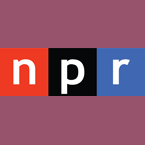

8.6 July 4 reading of the Declaration of Independence.7.3 Notable public radio programs not affiliated with NPR.7.2.2 Storytelling and cultural programming.7.1.2 Storytelling and cultural programming (in house).4.3 Underwriting spots versus commercials.Several NPR stations also carry programs from British public broadcaster BBC World Service. Its content is also available on-demand online, on mobile networks, and in many cases, as podcasts. NPR manages the Public Radio Satellite System, which distributes its programs and other programming from independent producers and networks such as American Public Media and Public Radio Exchange, and which also acts as a primary entry point for the Emergency Alert System. As of March 2018, the drive-time programs attract an audience of 14.9 million and 14.7 million per week, respectively. The organization's flagship shows are two drive-time news broadcasts: Morning Edition and the afternoon All Things Considered, both carried by most NPR member stations, and among the most popular radio programs in the country. NPR produces and distributes news and cultural programming.

It serves as a national syndicator to a network of over 1,000 public radio stations in the United States. It differs from other non-profit membership media organizations such as Associated Press, in that it was established by an act of Congress, and most of its member stations are owned by government entities (often public universities). (often called the "mothership" of NPR), with its NPR West headquarters in Culver City, California. National Public Radio ( NPR, stylized in all lowercase) is an American privately and publicly funded nonprofit media organization headquartered in Washington, D.C.


 0 kommentar(er)
0 kommentar(er)
